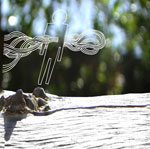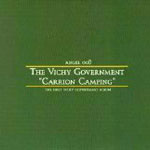
In the same delivery (I have my postman regimentally drilled to bring along the post to be considered here on the same day), come two of the latest LPs from Chicago’s Locust Music and Jib Door. The Locust label has recently wowed with extraordinary releases from the ancient-voiced Josephine Foster and the actually, bona-fide ancient Cast King, whom they re-discovered on Old Sand Mountain, Alabama, and gave his first release since a Sun Records demo some fifty years ago. Locust’s Function is the multi-armed brainchild of globe-trotting Australian musician Matt Nicholson, and The Secret Miracle Fountain is his first release since 2003’s epically-named The Zillionaire-Retarded Speeds of Ordinary, Measured Light. Nicholson’s new album comes after a period spent creating soundtracks for the sacred art suites of Buddhist Master Adi Da Samraj and a DVD documentary on transcendental art. On their sister-label Jib Door, Yea Big’s The Wind that Blows the Robot’s Arms is a cocktail of avant-garde hip hop instrumentals that promises to “shake up your cranium”. Both are considered with varying levels of insight in the happy trough below.
Spiky indie label Filthy Little Angels have grabbed attention like so many coyly winking, intellectual brunettes of late with releases from melody riot And What Will be Left of Them? and infatuating new-wavers The Long Blondes. They recently released an album of forgotten tracks by scathing young Northern Irish iconoclasts The Vichy Government, while a first singles club EP on new offshoot label Leaving Home Records pits retro revolution The Spells up against adrenalised German glitter-rock junkies Rocket Uppercut.

Having made tentative and somewhat fatiguing steps to define the spirit of indie of late (prompted possibly by the early encroachment of senility), I’m reminded of the genuinely spontaneous creative thrill and abundance of talent on the underground scene by a fantastically lo-fi compilation release by London independent label Stolen Recordings. Being a (self-denying) provincial gentleman somewhat at the mercy of alternative broadcasting, for me the twenty-two tracks on show go some way toward making up for the devastating lack of diversity in such spheres that was our inevitable lot after the passing of John Peel.
Inspired by a monthly free night they put on at the Spitz, Stolen has gathered together an impressive collection of bands that ranges geographically from New Zealand to Slough and artistically from electronica to psychedelia, halting at a wide array of stops in between. Beginning with the more raucous clientele showcased, Slough’s Manic Cough can be said to epitomise the LP’s impressive raw irreverence, a certain brashly manicured style crow-barring the door open to a new generation of the disaffectedly creative. Glam-rockers in the most outlandish sense (promo pictures show them regaling on stage in a sartorial range from angel wings to sailor-chic), the Cough are a ramshackle four-girl, one-boy fivesome in the best tradition of riot grrl indie, drawing early recognition as yet another new Slits/Le Tigre/Raincoats with a careless glee that defies more precise comparison. Illumined by the attitude-dripping squall-drawl of lead singer Annie, their track ‘There U R’ writhes and struts like a distinguished riposte from an urban gutter, forming a foremost shape in this kaleidoscopic netherworld of undiscovered delights.
The compilation functions on a healthy contrast of genre throughout, and at the other end of the raawk scale New Zealanders Ghost Club contribute a more straight-ahead number in the form of ‘Sea Shaped Stone’ with a still sparklingly-alternative zest, singer David Mitchell bellowing the impassioned lyrics with a lust in super synch with the resounding guitars. Sporting a freewheeling, Marx Brothers-type attitude, various members of the bands here happen to turn out for one another. Mitchell, in another guise, is also guitarist for The Mean Streaks, who’s ‘Mani’s Gate’ is a rigorous, testosterone-fuelled monument of heavy rock, his Ghost Club partner Denise Roughan in a great example of a community of genuine musical diverseness doubling up as a member of one of the compilation’s archly stylish curiosities, Lishka. Any indie compilation would of course be fatally incomplete without a dose of the elegantly enigmatic, and Roughan’s second band fill this billing superbly along with minimalist electronic duo Asja Auf Capri, and the frankly amazing Hot Silk Pockets.

Another great thing about this collection is that, rather than representing a horrid equivalent of daytime Radio 2 indie-rock, its middle ground is a fertile patch of meandering lushness in which numerous bands come graciously to the fore. Machine Translations’ ‘Quarantine’ is a wistfully ebbing hymn that’s chiming guitar riff lifts to heights of what can only be described as filmic grace. Not much information is available on many of the bands here and of Machine Translations only the secondary detail that their “Australian pop luminary J. Walker” also part-produced the new album of Australian experimental musician Matt Nicholson, considered below. Impeccably anonymous are The Kittens and Tap Tap. The Kittens’ ‘Every Analogue Recording for Itself’ evokes Blur at their lo-fi, humble/sad best, the track floating off into an ethereal realm of pure musical light, while Tap Tap’s ‘She Doesn’t Belong to Me’ is a steadily charming and chugging whirl of low-key melody and coaxing vocals. The Diamond Family Archive earn similar respect with a kindred kind of intricate earnestness. The way the Archive’s instrumentation merges, rises and falls is particularly brilliant in this, for the most part, raw-edged company, their ‘Tuesday’s Plan’ a stunningly romantic epic of high-art musical subtlety.
Another artist who can proudly be named among the distinguished middle ground of this record is Simon Breed. Breed and his band (including on guitar The Mean Streaks’ Matthew Wolverine) are gaining increasing popularity on the London circuit, having recently played packed-out shows at the Water Rats and toured Scandinavia with Nick Cave and the Bad Seeds. Their ‘My Eyes Have Seen the Glory of Your Face’ is illumined by iridescent shafts of Wolverine’s electric guitar to form a sprawling and elegiac epic of compositional vision to absolutely die for. As if all this earnestness could ever get too much for you though, parity is intermittently restored by another band with Nick Cave-dwellings, a London trio only conceivable in silhouette, and a self-proclaimed bird charmer. Welcome, the avant-garde.

Particularly impressive here are more clean-cut, though no less creatively purring slices from Sukie Smith and Stolen’s in-house band, Candy. Smith, otherwise known as Madam, is in the process of providing the soundtrack album for upcoming British indie flick Hush Your Mouth (“an urban ghost story”), and ‘Call America’, taken from her debut EP, is a fantastic, sultry slice of quintessentially English poise that denotes a major talent in the noble art of smoky chanteusery. Self-described as “music for outlaws, cowboys and glamour girls who won't give up on their idea of perfect love,” ‘Call America’ sees Smith’s band provide a timelessly atmospheric backdrop to her crystal-clear vocals that creates a truly vintage emotion. In the menagerie of genres embarked upon here, an alt-classical number is one of few we’re yet to encounter. Candy’s ‘A Breath’ comes across like Bach with a graffiti organ a funereal drone of eerie and distinguished atmosphere helped through by the nameless female singer, who’s soulfully fragile voice is the epitome of the small scale grace of the whole album.
Although exclusively indie in selection, Stolen’s policy here seems to evoke a Peel-esque utter lack of a constricting ethos to define, choose and be chosen. If the music on this LP has one thing in common it’s a unique freshness; that pure artistic miracle brought about by the kind of freedom that always informs a healthy attitude. In its empathy for the sheer range of expressions that come under the indie umbrella, impassioned by its ethos, this LP puts many current mainstream-alternative bastions in a new light with a swagger and a smile, spray-painting their hallowed walls with a brilliant discomfort.

The last glimpse UK audiences got of the visionary Australian musician Matt Nicholson was in support of acclaimed electronic/guitar experimental artist Christian Fennesz in a sell-out show at the London Institute of Contemporary Arts. Although still only twenty-nine years old, Nicholson has from an early age been taken with the more expansive realms of sound art, to an extent that now, bypassing more conventional allies of his age, he’ll comfortably count the likes of Fennesz among his peers. Possibly because of this youth and the unfortunate reputation that is naturally evoked with the first heed of a guitar expanse or glimpse of an overtly luxurious song title, Nicholson’s particular brand of folk ambience will always be perceived as treading a fine line between the genuine and pretentious. Yet the sound he creates is as consummate and accomplished as you’d hope for in anything that strays into “meditative” realms.
Journeys of Western artists into the East have historically yielded mixed results, with the omnipresent danger of the ego and raw ambition of the former never giving way to the genuine, humble equilibrium of the latter. But when the relaxed ingenuity and foresight of the East is properly assimilated, the results can be astonishingly distinguished. For well-worn examples, contrast the early prose of Hermann Hesse with the latter, knowledge-drenched lucidity of the likes of Siddhartha and The Glass Bead Game; the early romantic compositions of John Foulds with his later fulfilment in Eastern-influenced exoticism; or more esoterically, indie outsiders the early exuberance of Ooberman with their latter, soulful, scope. Nicholson’s The Secret Miracle Fountain follows his first album into such experimental realms, the results if anything augmented by a greater assimilation of world music.

On a record in which individual musical flourishes have a prime importance, special mention also goes to the eminent musicianship of Ruth Schoenheimer. Creating a couple of highlights of the album, Schoenheimer’s piano opening over a field recording of rushing water in ‘Unshaken (Positively Implacable)’ is evocatively idyllic, and her cooing to open ‘The Wind Itself’ sensually hypnotic, both flourishes giving way to vocal and instrumental rushes that give the album a vital alternative tempo. Schoenheimer also provides gentle vocals along with Sara Daly for ‘Alone With the Real Magic Dragon (Hanelei)’, a sun-soaked mesh of avant-garde instrumentation and field recordings that conjures a languorous adrenalin rush and evokes a kind of organic Arcade Fire. Matt Nicholson can already be justifiably labelled as one of alternative music’s answers to Western art’s more consummate assimilators of the East. With his continent-hopping consideration and ability to evolve like a global chameleon, he can also be termed a musical hero of rarely realised proportions. The Secret Miracle Fountain is an experimental rock album that glitters to its depths like a musical coral a broad and startlingly mature representation of world musicianship with not so much as an instrumental ego in sight.

In polar opposition to the likes of The Secret Miracle Fountain… If you’re a crazy guy like me, or to put it more modestly… if, like me, you’re not so crazy, then this is an LP that can open the pores widely to the blissful breeze of madness. Stefan Robinson (aka Yea Big) is a white man who makes no pretensions to being black, but just is, matriculating with cutting edge Chicago alt hip hop pals like Kid Static and Spunky Toofers to make a CD that rolls along like the greatest party of your life upside down, and a night of sci-fi dreams on the ceiling.
The Wind That Blows the Robot’s Arms has a genuine humour, consideration and insight in its avant-garde stylings. Throughout, Robinson jump cuts his more manic pieces to bursts of humorous and visceral brevity. He also paints the middle ground with frenetic imagination, and draws out only the more digestible innovations with the successful pretence of composition. In an album of manically diverse proportions, this gives the vital illusion of “attention deficient” creativity, from which to logically move forth.
Several short, abstract numbers like ‘Look for and Remove Any Foreign Objects Seen in Mouth’ (six seconds of tuning your radio with your head inside the electronics), revel in an anarchically disruptive mischief, giving way each time to nights and twilights of cinematic sci-fi of varying temperament. ‘But We Will Try Nonetheless’ is one of numerous tracks that sound like they’re coming out of a pretty fine subterranean disco, while ‘Neurosis of the Giver’ is an outsider’s soundtrack to the inner world of Speedy Gonzales. The Yea Big retinue rarely fail to take advantage of their second by second creative ethos, and inspirational asides are sprinkled alongside instrumental humour like gold dust. Exquisitely, ‘Firstmeal’ has Robinson interject the album’s most incomprehensible avant-garde mixings with an apology for “fucking up”, before starting again, while ‘Manufacturing Morals’ takes the comically improvisational biscuit by being the exaggerated sound of someone eating from his fish bowl while busy at the typewriter.
After establishing the LP’s status as veritable funhouse of arch hip hop imagination and cranial shake-ups, when the times comes Robinson takes to the more bona-fide compositions with a different kind of nocturnal intent. ‘It will be Tasteful’ is a night of sleep in reverse, possibly after attending a Yea Big party, a quaint triangle tapping lending a certain lucidity to its dreamy, perversely atmospheric strut. In ‘My Principles Far Outweigh My Common Sense’, one of those manic phone call voices is taken out of context and carved into an impressive movement of warped percussion. ‘Neurosis of the Giver’ is a soothing, coconut-clapping dance around technological embers, and ‘Nice People are Those Who Have Nasty Minds’ is a fragmented mesh of improvisatory guitar that breaks into an extraordinary melody before giving way to the next ascent of beats, only to resume on its meandering way in the next. Another broad compositional highlight comes in ‘Please Die, and Leave Me Alone’, a choir of mice appearing above a conventional hip hop beat and menacing metallic background, drilled to within an inch of its life in the name of the sport.
From The Wind That Blows the Robot’s Arms, one can only conceive the life of Robinson and his pals as an endless jaunt of night hours, the closest it ever gets to day being a peculiar starry twilight, which presumably testifies to its illusive charm. With not so much as an [overly] introverted egghead in site, here we have a pinball machine of obtuse and thrilling sounds, caressed into context with the vision of hip hop masters and appetite of lunatics. It fits a sane man like the notorious eye-opening needles of Dario Argento’s murderer in Opera.

If you’re one that always needs some kind of redeeming musical style to enjoy your aural art, then you’d be hard pressed to find any empathy with The Vichy Government. Bitter and irreverent iconoclast Jamie Manners stands in front of his pal’s grim electronic backdrops with an austere malevolence, and takes to his music with an anti-social lust that sees the lone Casio keyboard take on bleak minimalists’ symbolic effect. Manners even seems to begrudge the spartan staccato the Casio does manage to churn out in synch with a hampered drum machine, the pal for his part pounding it like a spiteful kid wilfully spurning his mate’s new guitar on Christmas day.
Their shtick apparent from the very start, it’s left to Manners’ monologues to weave a relationship with your head, the profundity of which only becomes apparent when penetrating the innermost heart of his apparently snide demeanour. A Shankil, Belfast-raised, Cambridge-educated and acutely perceptive young man, Manners waxes lyrical on issues from celebrity culture to Northern Ireland, hitting the mark to a lesser extent with his cross-cultural witticisms of secondary experience than with a genuine, passionate individual rebellion against his homeland’s doctrines. Although in tracks like ‘Arranged Marriage’, musings like “…but, if they stuck me in some dodgy blokes’ harem, with an ink dot on my forehead and a sapphire on my navel, I’d let the eunuchs pail me up, and initiate the other girls, and with my husband decided it was my lucky night, I’d spit in his face and unleash my claws (although, maybe he’d enjoy that…)” typical of Manners always corrosive and biting penmanship have an undoubtedly thrilling quality of irreverence, the parts where I really love this band are during songs like ‘Who Makes the Calibans’ and ‘Orange Disorder’, where Manners’ voice is heard at its most solemnly individualistic and soulfully defiant.
In these overt, first-hand attacks on Northern Irish cultural indoctrination, Manners’ embittered demeanour and lyricism truly cuts. “You said you’d make me stand upright, but all you did was teach me vice / The island wasn’t spoiled before you turned up with ideas and guns, now there’s a Macdonalds on every corner, selling turds in buns”, is the highlight of the heartfelt diatribe in ‘Who Makes the Calibans’, ‘Orange Disorder’ featuring the nigh on heroic riposte of “Some inbred piece of shit in a bowler hat and white gloves waves a pamphlet in my face and tells me ‘This is your culture’ / Fuck you I know my culture / It’s Roxy Music, Billy Liar, Brass Eye, Celine… / It’s not a charade of viscous brats marching down our street and making that parochial din on tin whistles and Lambeg drums … and burning cars in the name of freedom fighting / And it’s not turning scum like Bobby Sands into plasticine saints”.
At their best The Vichy Government are a band who’s angrily informed message leaves a lump in your throat, at all times one with whom you’d ultra-proudly spike a mainstream event. Carrion Camping does everything it sets out to do with minimalist precision and utmost rebellious soul. How cataclysmically good it’d be if it imploded at the end like Inspector Gadget’s self-destructing message…

Singles Club EP One The Spells/Rocket Uppercut (Leaving Home Records)
This first release on Leaving Home Records follows a spurt of dual nuggets on Filthy Little Angels that have featured the likes of spiky ex-Mo*ho*bish*o*pi lads The International Karate Plus and now-eminent new wavers The Long Blondes, giving the label a deserving reputation as purveyors of the arch and stylishly fun. This couplet works as an apposite one-two, the controlled, quintessentially British alt-indie of The Spells forming a florid and stylishly restrained environment for the launch of one ebullient Rocket.
The Spells are a band that formed at Aberystwyth University in 2004 with noble
intentions of putting the “kinky” back into smart (and kinky) indie. As the proverb goes though, for all good things you have to wait. Their opener ‘Witness’ promises to soar into the stratosphere while all the time meandering under the roof, content to distil an artful tautness from which their second, eponymously-titled track glides. ‘Spells’ is a skipping indie waltz that takes to the thermals and spreads out into its broader shimmer with definitive finesse, singer Ilona Burton’s
deadbeat voice as close as it gets to being liberated amidst the frantic percussion
and electric guitar loops. The Spells have no qualms about referencing Britpop
upstarts Echobelly as an influence, and their humble, sustained melodic sound
with its stylishly art-punk edge would in a kindred manner cleanse the air of
Top of the Pops and indie sheds alike.
Clean air is apparently one of the myriad advantages of Regensburg, Germany,
a medieval city that’s just happened to give birth to a modern art-guitar monster. Rocket Uppercut boast such a sound that having them emerge slowly out of the famous Danube river with instruments at hand could be the musical equivalent of Sophia Loren’s
pulsating and icon-making appearance out of the Greek sea in Boy
on a Dolphin. Their tracks, ‘The Arrival’ and ‘Smashing on Love’, resound with an accomplished rhythm dripping with indie glamour and vision, singer Bianca Haslbeck weaving drool-worthy lines through the robust guitar shapes and crashing symbols with a voice somewhere between the guttural howl of Rock Lore and sensual shimmer of Justine Frischmann. Put The Spells and Rocket Uppercut in suitably accentuated character on this month’s Must-Hear list along with these other nuggets and you won’t
go far wrong.
© 2006 Neil Jones